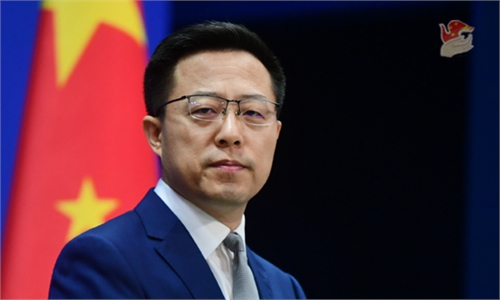Netherlands signals it won't follow US' chip ban on China, move set to bolster Japan, South Korea's resistance to Washington
Move likely to bolster Japan's, South Korea's resistance to US coercion: analysts

chip Photo:VCG
The Netherlands will defend its economic interests when it comes to the sales of chip equipment to China, a senior Dutch official said, sending a strong signal that the European country - home to world-leading chip company ASML - will not cave in to the US coercion despite the latter's stepped-up pressure.
The move, coming after South Korea's reported emphasis on not ruining exports to China as a precondition for joining the US-led "Chip 4" alliance, will likely bolster Japan's and other relevant members' resistance in following US' dictates, as they learned that bowing to Washington's pressure reaps no gain but risks giving up one of the world's most lucrative semiconductor markets to competitors, and would even create discord in bilateral economic relations with Beijing, industry insiders said.
Dutch Foreign Trade Minister Liesje Schreinemacher told lawmakers on Tuesday that the Netherlands will make its own decision regarding ASML's chip gear sales to China amid trade rule talks with the US, Bloomberg reported.
"It is important that we defend our own interests - our national safety, but also our economic interests," Bloomberg quoted Schreinemacher as saying.
Schreinemacher noted that the Netherlands would be "worse off" if the country "put that (interests) in an EU basket and negotiates with the US, and in the end it turns out we give away deep ultraviolet lithography (DUV) machines to the US."
The response came after the Biden administration ramped up pressure on allies including Japan and the Netherlands, pressuring them to align with a sweeping ban it issued in early October that bars a wider range of advanced chip exports to China.
Netherlands-based semiconductor manufacturer ASML said in a statement sent to the Global Times on Wednesday that it does not want to speculate or comment on the matter. "This is a discussion between governments".
Industry observers said the Dutch government's comment is a critical one, because it explicitly gives voice to the rising dissatisfaction toward the US, which has been reverberating among its allies, and is set to reinforce other countries' decisions not to succumb to the US coercion.
Analysts also said the move is partly inspired by the tough stance of South Korea in joining the "Chip 4" alliance, a US-led small semiconductor circle with the ultimate aim of creating a "semiconductor barrier" against the Chinese mainland.
In August, Seoul reportedly laid out conditions for joining the alliance, which largely played down the small clique's anti-China undertones. According to a report by Korean news portal Pulse News, Seoul reasoned that the four members "should respect the one-China policy and not mention any export barriers on China."
"The actions by US allies carry special significance in terms of how China could avoid the turmoil of the US-led lingering tech war and expand international business cooperation," Ma Jihua, a veteran telecommunication industry analyst, told the Global Times on Wednesday.
Ma added that the Netherlands' open remarks showed that the benefits of resisting US pressure "far outweigh" surrendering, which would provide a demonstration effect and make more US allies such as Japan follow suit.
ASML is not selling its extreme ultraviolet lithography (EUV) to China as it complied with a former US ban. But in terms of less-advanced DUV, the stakes related to the Chinese mainland market are high and a "decoupling" could cut off the bulk of profits of the company and undermine its research and development investment in future technologies, according to analysts.
According to ASML's 2021 financial statement, the Chinese market was its third-largest, accounting for 14.7 percent share of its global revenue last year. In 2021, its equipment shipments to China accounted for a 16 percent global share.
"Unlike EUV, where ASML has a near-monopoly, competition in the DUV industry is quite intense. If ASML withdraws, the gap will soon be filled by other rivals in South Korea and Japan. Chinese chip firms have also made major breakthroughs in chip manufacturing, and they are close to providing homegrown substitutes," Ma said, which could mean a "permanent loss" for ASML.
A Chinese industry official, who spoke on condition of anonymity, told the Global Times on the sidelines of the 5th China International Import Expo in Shanghai that a large foreign semiconductor industry player "quickly" demonstrated its lithography machines as ASML came under the spotlight amid escalating US tech restrictions on China.
The struggle of ASML is not unique. Industry observers said that if the new measures are strictly implemented, it could put as much as 30 percent of some US and global chip industry giants' total revenue at risk, as China accounts for one-third of their total revenues.
At a regular press briefing in early November, Zhao Lijian, a spokesperson for the Chinese Foreign Ministry, stressed that the formation and development of the global chip industry chain is the result of the combined effect of market laws and corporate choices.
"A certain country has repeatedly abused its national power, politicized, instrumentalized and weaponized sci-tech and trade issues, and maliciously suppressed China, which will not only seriously undermine global trade rules, but also damage the stability of the global industrial chain," Zhao said.




